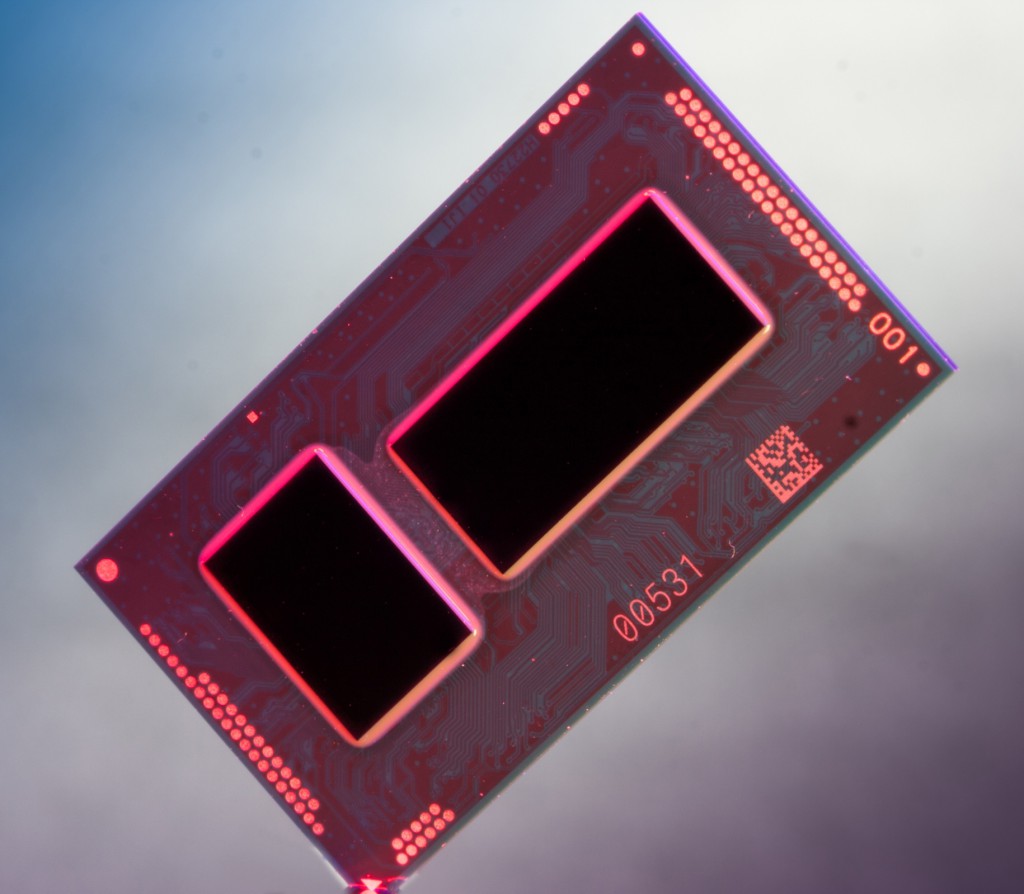A technology enthusiast has conducted the first benchmarks of Intel Core i7-5500U “Broadwell” processor’s integrated graphics engine and compared it to that of Intel Core i7-4510U “Haswell” processor. While the results are promising, they do not demonstrate any radical performance boosts.
Intel Corp. has been gradually improving performance and capabilities of its integrated graphics processors for many years now, in 2015 the company will bump up performance of its graphics processing units two times: when it releases the code-named “Broadwell” chips and when it releases the code-named “Skylake” CPUs. According to early benchmarks of the “Broadwell” GPU, the new graphics adapter will be around 20 per cent faster than existing “Haswell” GPUs at the same wattage, but there are no wonders here: the new microprocessors feature higher amount of execution units and are made using thinner fabrication process.
The Dave Channel from YouTube has managed to obtain two laptops featuring similar specifications, but based on the Core i7-5500U and the Core i7-4510U processors. Both CPUs are ultra-low-power system-on-chips that integrate core-logic sets and are designed for the same market segment. SweClockers web-site has found performance results of the two systems in 3DMark Vantage’s database: the Core i7-4510U-based PC scored P3868, whereas the Core i7-5500U-powered laptop scored P5124.

Given that the new “Broadwell” chips feature higher clock-rates and increased amount of execution units, it is not surprising that they get around 20 per cent higher benchmark scores.
What is unexpected is that the new eighth-generation (Gen8) Intel graphics architecture does not have a lot of advantages over Gen7.5 graphics architecture (which is used with “Haswell” processors). The Gen8 architecture sports execution units (EUs) with 2*4-wide vector SIMDs with both simultaneous multi-threading (SMT) and fine-grained interleaved multi-threading (IMT). By contrast, the Gen7.5 graphics architecture is based on EUs featuring 2*4 wide vector SIMDs with “only” SMT technology.
It looks like the main advantage that the “Broadwell” and “Skylake” Gen8 graphics will have over Gen7.5 graphics of the “Haswell” is increased amount of execution units, which is not bad. The ability to increase the number of EUs is enabled by thinner process technology and better designs. The maximum amount of EUs in the “Skylake” CPUs will be 72, therefore, their performance will be significantly higher than that of today's solutions.
Intel did not comment on the news-story.
Discuss on our Facebook page, HERE.
KitGuru Says: The results that the Core i7-5500U “Broadwell” central processing unit demonstrated in 3DMark Vantage look pretty good for a 15W microprocessor. Of course, we hoped that the Gen8 graphics with IMT technology will bring more advantages, but given the fact that we are only talking about one benchmark, it is hard to draw any solid conclusions here.
 KitGuru KitGuru.net – Tech News | Hardware News | Hardware Reviews | IOS | Mobile | Gaming | Graphics Cards
KitGuru KitGuru.net – Tech News | Hardware News | Hardware Reviews | IOS | Mobile | Gaming | Graphics Cards




It would be nice to see i3 or Pentium with 72 EUs. That will make the perfect budget gaming CPU if you can’t afford external GPU. Of course the price is also important.
They’ve released some of their better integrated graphics parts in i3s in years but the thing is they release it a little too long after launch and even in the closing of its generation. I got an i3-2100 which had an HD Graphics 2000 part and they released the i3-2125 with an HD Graphics 3000 part a few months after I bought mine. The difference is roughly 5 frames on average, but when it comes to gaming at 30FPS that 5 extra FPS could mean a lot.
And if it’s budget PCs just used for some games like Dota 2 and League of Legends, it’s a lot better to go AMD, better graphics when it comes to integrated parts. That is of course, considering the fact that the buyer isn’t gonna upgrade to a dedicated GPU afterwards, if the buyer is then it’s still better to go Intel, as even i3s could handle AMD’s quad cores well on some benches.
Check out Asus Website for the TP300L
http://www.asus.com/support/FAQ/1009755/
http://www.asus.com/ph/Notebooks_Ultrabooks/ASUS_Transformer_Book_Flip_TP300LA/HelpDesk_Download/
Well you get lower power consumption with Intel and as you said – better CPU performance which comes handy when you hook up dedicated GPU. I got FX-6300 two years ago with the expectations that games are going to use more cores. Today, two years later, games are using these 6 cores but 6300 is on par with i3s in games. So I’m happy that Intel are pushing the iGPU performance up.
6 core cpu on par with a dual core? wow that’s pretty sad.This is why i go Intel always.
The CPU yes, the integrated CPU, not even close.
Technically, i3 is not real dual core CPU because Hyper Threading. FX-6300 is faster than i3 where all cores are fully utilized (3D render, video encoding and etc.) but fails in games because they either don’t use all cores or they use them all but not at 100%. Which is why AMD did complete mess with Bulldozed architecture.
No, the i3 is a dual core with HT to give it 4 threads.
And to anyone who thinks more cores/threads doesn’t help, since Far Cry 3 actually showed utilization of all 4 threads, I turned off hyperthreading which resulted in the two cores being maxed out and me losing 5-10fps (mostly in towns).
It is dual core but not clear dual core as Pentium or Celeron. More threads gives you more performance if the game can utilize them.
Not a “clear” dual core? Its an ‘I’ series chip..? Does this mean you’re saying that the i7 isn’t a “clear” quad core?
The i3 is most definitely a true dual core, it just offers HT to give it a bit of a performance edge over the core 2 and Pentium Dual Core chips as well as the more modern Pentium and Celeron chips.
What? CPU Yes, Integrated CPU not? :-/
i3 Haswell is actually faster than FX6300 in 80 or 90% of games and the HT of i3 makes all the diference compared to Pentium G processors. FarCry 3, Crysis 3 or Hitmal Absolution are a few cases where FX6 and FX8 are better because that engines use up to 8 cores, for everything else (talking about games), a simple i3 4330 is far better than FX6300 or even FX8320 which is priced close, specially at low resolutions or whith a High-end Graphics card.
If you do streaming and video encoding, those extra cores come in handy.